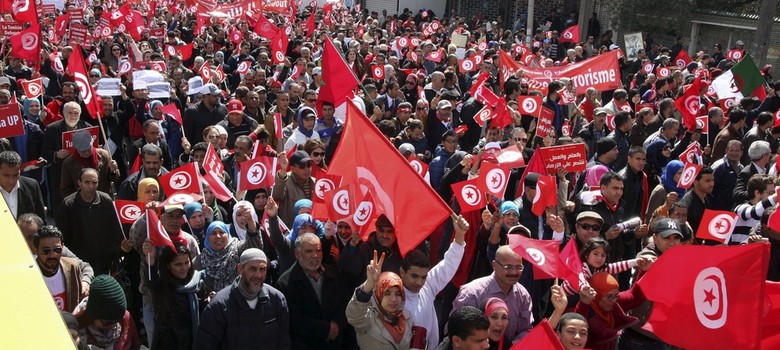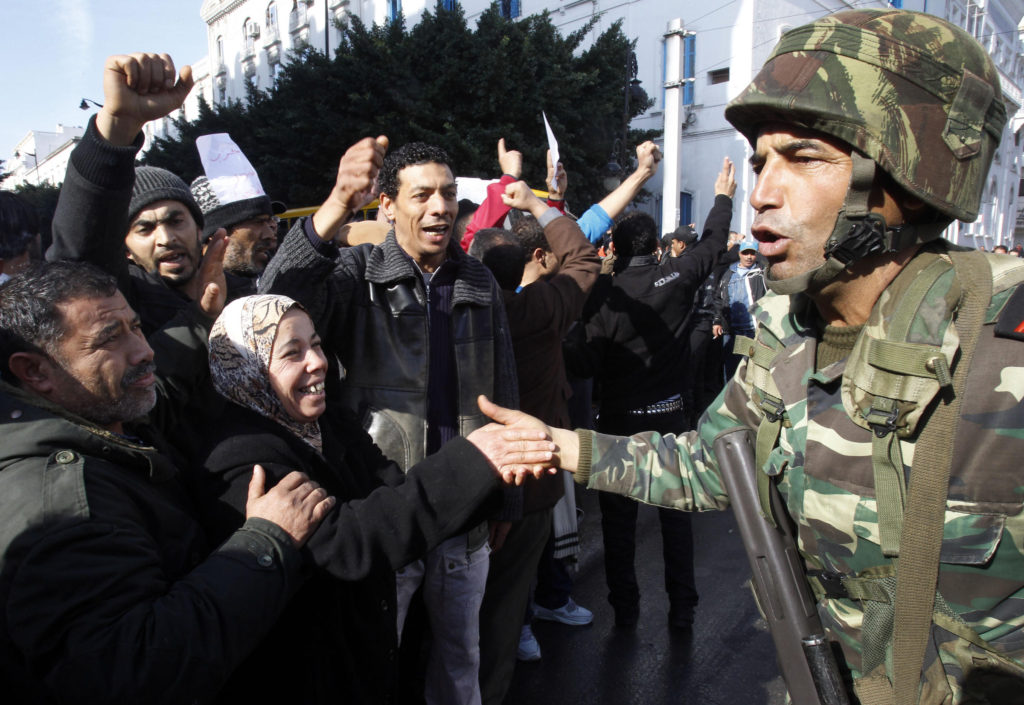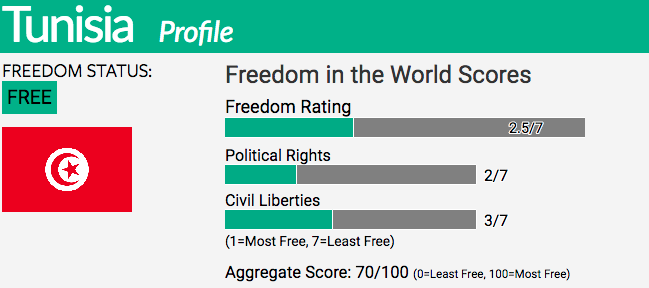Tunisia and Egypt: a Tale of Two Militaries?

Tunisia and Egypt are two of the most important and influential countries in the Middle Eastern and North African region that underwent dynamic power-shifts in the Arab Spring of 2011, a movement which sent shock waves around the globe and transformed the realm of international politics completely. However, it is quite interesting to point out that both countries have since gone on strikingly contrasting journeys. An insight into the trajectories of the Tunisian and Egyptian revolts through the lens of their respective militaries, their role and behaviour during the revolution and in its aftermath, is needed to understand why such a stark dichotomy exists with regards to the two countries’ political status quo. So much so that despite having similar start points, they are arguably at the opposite ends of the democratic spectrum today seven years after the Arab Spring.
Tunisia, from the very inception of President Ben Ali’s regime in 1987, saw its military deliberately kept out of politics by the state administration. The military was mostly neglected as an institution and was overshadowed by other security bodies of the regime, such as the police and the National Guard. As suggested by military sociologist Zoltan Barany in the October 2011 issue of the Journal of Democracy, Tunisia was primarily a ‘police state’. In that regard the military had consistently been funded and equipped poorly. The regime of Ben Ali, ironically a former military officer himself, maintained a stronghold on the country for over four decades by enhancing the power and role of the police and various other security agencies, sidelining the military to the very margins of society. The fact that Tunisia had no major external threats or urgent need for protection made it easier to divert a high proportion of state funds away from the military budget. Large chunks of states revenues were distributed to the Interior Ministry and were splurged to enhance the roles of the police and other non-military state security bodies. According to Washington Post, “at the end of Ben Ali’s reign in 2011, the funding for the Defence Ministry was half that of the Interior Ministry”.
Before the Arab Spring, the Tunisian military’s sole purpose, it seemed, was to patrol the borders. This ingrained attitude of military detachment from the political sphere was carefully established by Ben Ali who had appointed several of his own personal confidantes and family members to government positions and had selectively restricted the military to the barracks. That along with the fact that the army officers had been trained in the US ensured that they were more professional and ‘apolitical’ and thus saw it as a disservice to their line of duty to participate in any political activity. This could be one of the reasons why Ben Ali was able to maintain a stronghold in Tunisia and never faced any major opposition or attempts to overthrow him in military coups until the advent of the Tunisian revolution in 2011. However, although the military had not taken any concrete steps against the regime, the years of neglect and widespread nepotism and corruption by the autocrats in power had led to a simmering sense of disillusionment and dissatisfaction in the ranks of the military officers.
During December 2010, when the Tunisian revolt started gaining momentum and people started pouring out to protest the corruption and systematic oppression of the regime, the military had no major incentive in curbing the protesters. The military made no such efforts to engage in any sort of counter-revolutionary measures to silence the protesters and aid the regime in maintaining their iron fist over the country. As the revolt went on and gained international media coverage and global attention, the military officers made it very clear where they stood when they protected the revolutionaries from the attacks of the police. The military had now taken an active stance and that was one in favour of the revolution.

As previously mentioned, the training of the Tunisian military officers had made them quite apolitical and although they did not help the regime against the protesters during the Arab Spring, it did not necessarily mean that they were themselves interested in gaining control over Tunisia. It is possible that the professional demeanor and apolitical training of the Tunisian military prevented them from seizing power as they saw themselves as the ones responsible for protecting the state from external forces instead of getting involved in domestic power struggles that could potentially destabilize the state and make it vulnerable and exposed to external attacks. This was further verified when after the ouster of Ben Ali, the military did not impose martial law but instead appointed a new President in the form of Fouad Mebazaa and retained Ben Ali’s Prime Minister, Mohamed Ghannouchi, as the Prime Minister for the temporary period until new elections could be held within 60 days. Furthermore, a commission was set up to reform the constitution, all of which set Tunisia on its trajectory towards a more democratic future. Thus, despite some challenges resulting from the pre-existing institutions, and practices belonging to the old regime and its corruption, Tunisia is now on its path to democracy with greater civil and political rights granted to its people than in the recent past, and a Freedom House freedom rating of 2.5/7 in 2018, allowing it to be declared ‘free’.

An argument can be made that the reason the military has not yet staged a coup or attempted to take over the governing of Tunisia has a great deal to do with the greater importance and funding given to the armed forces by the current government which is a stark contrast to the previous regime. For example, the civilian government increased the funding of the Defence Ministry post the revolution, with an average increase of of 21% per year, according to The Washington Post. This coupled with a greater power balance between the military and the police, compared to before, could account for feelings of satisfaction within the military ranks.
Egypt, on the other hand, had a very different story than Tunisia in terms of the treatment of the military by President Hosni Mubarak’s regime and their response to the revolution.
First of all, the armed forces of Egypt enjoyed far greater involvement in the economy and enjoyed several financial benefits, luxuries and preferential treatment under Mubarak’s regime than their Tunisian counterparts. The military officers were paid hefty salaries and enjoyed several privileges, properties, and businesses as well and there was ample military funding. Thus, unlike in Tunisia, the Egyptian army was not underfunded, poorly equipped, marginalized or pushed to the sidelines. Yet when the time came to support the regime against the protests, the military chose an alternative route.
Initially the military did not side with the protesters and unlike the Tunisian military which had been largely neutral, the stance taken by their Egyptian counterparts was one which could be divided into two fragments: one which was more self-interested and enticed by the idea of political power and one which was more inclined towards supporting the regime. Military expert Zoltan Barany mentions in the his book ‘How Armies Respond to Revolutions and Why’ that “some army units were actually detaining and abusing protesters or enabling the police to assault them”. Thus the initial stance of Egyptian military was far more ambiguous than that of Tunisian armed forces. The military’s subtle interest and small motions to gain some sort of autonomy during the early weeks of the revolt could easily be considered a foreshadowing of Egypt’s post-revolution trajectory.
However, once Mubarak ordered violent police suppression of the revolution, the military stepped in, forcing Mubarak to resign. The Supreme Council of Armed Forces (SCAF) assumed power during the transition period and promised to schedule free and fair elections and hold a referendum to decide the new constitution. Parliamentary elections brought the Islamist party of the Muslim Brotherhood to power, a party which had historically been on the opposite sides to the military and it seemed like democracy had never been nearer.
Following the parliamentary elections, the Brotherhood’s candidate Mohammed Morsi won the Presidency. However, both the President and Parliament were given limited powers and were considered inferior to the military in the immediate aftermath of the revolution as the military retained control by issuing a constitutional amendment that granted them a veto of sorts over all things related to ‘legislative, diplomatic and policing powers’ during the transition period. Constant back–and–forth between the Muslim Brotherhood and the SCAF eventually led to the Parliament being dissolved by the military. Morsi tried to issue an executive decree that would give him power over the constitutional courts so that he could implement his highly conservative Islamic constitution, and he was subsequently overthrown by the SCAF led by Field Marshal Sisi in 2013.
An argument can be made that the military did not sack Morsi out of self-interest or greed for power but rather out of fear that the executive decree issued by him could be a stepping stone towards another autocracy as it gave the President unprecedented power to overturn court decisions regarding legislation, thereby disregarding the check and balance system in place. It can be alleged that the military was simply trying to protect the long term democratic interests of the country as it was safeguarding the constitution by ensuring checks and balances to the presidential power.
A counter argument can be made that it was a calculated move made by the SCAF and Morsi’s presidential decree was just an excuse to assume absolute control as the military had been slowly expanding its reach and control even before the decree was issued by Morsi.
With the advent of Sisi’s rule, the country was once again plunged into a dictatorship, albeit a military one, a claim that is evidenced by Egypt’s post-Sisi rate of 6/7 by the Freedom House in 2018. The Freedom House also declared Egypt to be ‘not free’, as opposed to Tunisia’s rate of 2.5/7 and ‘free’ status. Thus, although Mubarak’s lengthy autocratic rule was abolished, post the Arab Spring, Egypt has not yet seen any substantial leaps towards a democratic future
Freedom House rating for Egypt 2018 which shows how even after the overthrow of Mubarak’s autocratic regime, Egypt is a far from a democratic setup.
Perhaps the active involvement of the military under Mubarak’s regime led them to be more politically ambitious whereas the apolitical training of the Tunisian military kept them disinterested in assuming power. Its plausible that the military’s support for the 2011 Egyptian revolution was merely a premeditated step on their part towards a hegemonic rule over the country in the long run. Or it could all have been unplanned and spontaneous.
Regardless of the reasons for it, the current status quo in Egypt is that the SCAF, by way of Sisi, now maintains an iron fist over Cairo, political opposition is minimum, the Brotherhood is banned and a point can be made that democracy is as or more distant than it was before the revolution. By contrast, Tunisia has just celebrated its seventh year after the revolution and albeit some economic and political challenges, it is on its way towards establishing itself as a stable and successful democratic country. This really is a tale of two countries that lie on opposite ends of the democratic spectrum today.
Edited by Asma Saad

